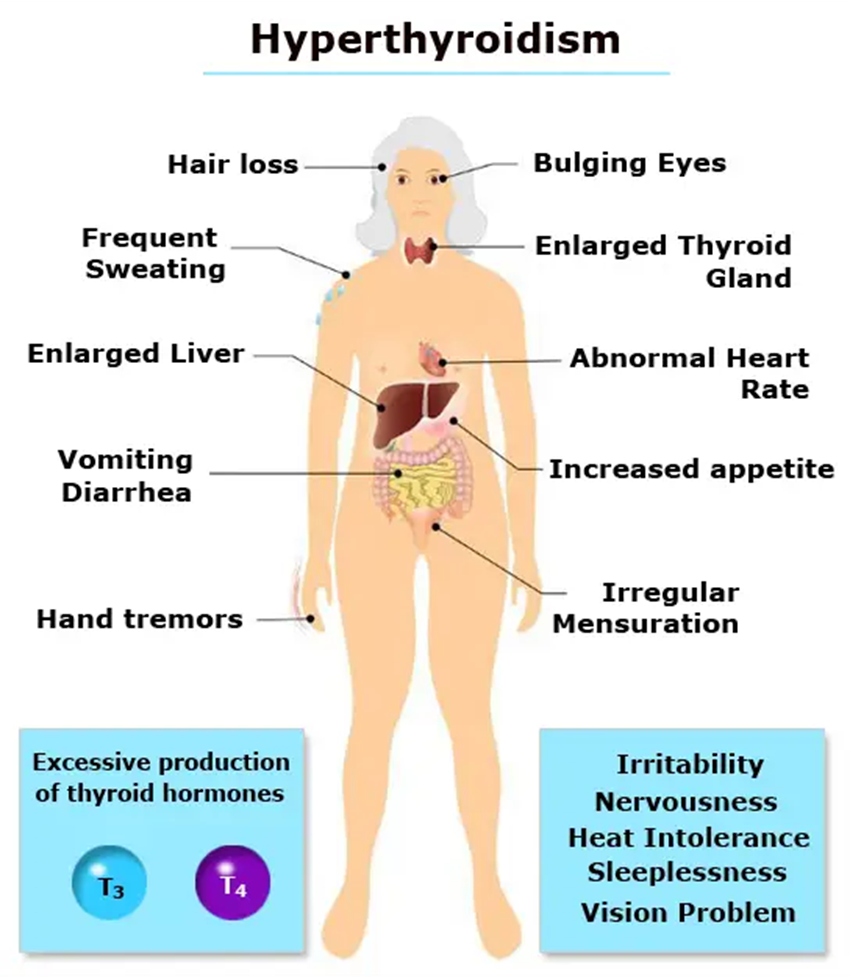A nurse is caring for a client who has hyperthyroidism. Which of the following manifestations should the nurse expect the client to report?
Frequent mood changes
Weight gain of 11 lbs in 3 weeks
Sensitivity to cold
Constipation
The Correct Answer is A
A. Frequent mood changes:
This is correct. Hyperthyroidism is associated with increased levels of thyroid hormones, which can affect the nervous system and lead to mood changes, including irritability and anxiety.
B. Weight gain of 11 lbs in 3 weeks:
Weight loss is more characteristic of hyperthyroidism due to increased metabolism. Rapid weight gain is not typical.
C. Sensitivity to cold:
Sensitivity to cold is more characteristic of hypothyroidism, where there is a deficiency of thyroid hormones.
D. Constipation:
Constipation is more commonly associated with hypothyroidism, where there is a slowing of the digestive system.

Nursing Test Bank
Naxlex Comprehensive Predictor Exams
Related Questions
Correct Answer is D
Explanation
A. Flushed skin: Flushed or warm skin is more characteristic of hyperthyroidism, where there is an excess of thyroid hormones.
B. Palpitations: Palpitations or a rapid heartbeat are more characteristic of hyperthyroidism, where there is an excess of thyroid hormones.
C. Bulging eyes: Bulging or protruding eyes, known as exophthalmos, is a characteristic sign of Graves' disease, which is a specific type of hyperthyroidism.
D. Fatigue: This is correct. Fatigue is a common symptom of hypothyroidism, reflecting the overall slowing down of the body's processes.
Correct Answer is A
Explanation
A. "If a vial of insulin will be used up within 21 days, it may be kept at room temperature."
This statement suggests a duration of up to 21 days for room temperature storage after the vial is in use. However, most insulins can typically be stored at room temperature for up to 28 days after initial use. This recommendation might be more conservative than necessary for many types of insulin.
B. "If a vial of insulin will be used up within 2 weeks, it may be kept at room temperature."
This choice suggests a timeframe of 14 days for room temperature storage after opening the vial. However, for many insulins, the recommended duration for room temperature storage after opening is up to 28 days.
C. "If you are going to use up the vial within 1 month, it can be kept at room temperature."
This option extends the timeframe to 1 month for room temperature storage after the vial is in use. However, the generally recommended duration for many insulins is up to 28 days after opening.
D. "If a vial of insulin will be used up within 1 week, it may be kept at room temperature."
This choice suggests a very short duration of 7 days for room temperature storage after opening the vial. Most insulins can typically be stored at room temperature for a longer duration after initial use.
Whether you are a student looking to ace your exams or a practicing nurse seeking to enhance your expertise , our nursing education contents will empower you with the confidence and competence to make a difference in the lives of patients and become a respected leader in the healthcare field.
Visit Naxlex, invest in your future and unlock endless possibilities with our unparalleled nursing education contents today
Report Wrong Answer on the Current Question
Do you disagree with the answer? If yes, what is your expected answer? Explain.
Kindly be descriptive with the issue you are facing.
